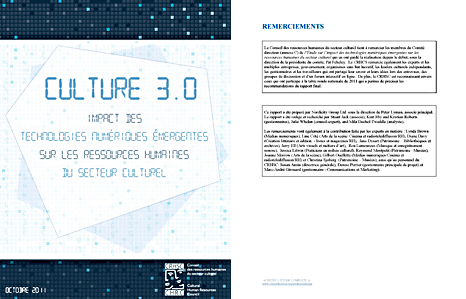Research
Cross-sectoral
Additional research documents are available within our discipline specific mini sites.
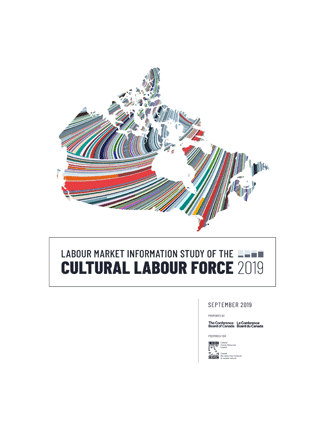 |
2019 Labour Market Information study of Canada's cultural workforceTo all Canadian arts and culture sector workers, employers and organizations, the Cultural Human Resources Council (CHRC) is proud to announce the release of the 2019 Labour Market Information study (LMI) of Canada’s cultural workforce. This study was undertaken in collaboration with the Conference Board of Canada (CBoC); and was funded by the Government of Canada's Sectoral Initiatives Program. |
 |
2017 National Compensation Study – For Managerial and Administrative Positions in Not-for-Profit Arts OrganizationsThis much anticipated study is an update to a similar studies in 2008 and 2003. The findings show there have been only minimal compensation improvements, particularly for the small and mid-sized organizations which make up the majority of the arts organizations in the sector – and in fact over the nine-year period since 2008, real wages actually decreased. The study was undertaken by CHRC and Mercer (Canada) Limited with financial support from the Canada Council for the Arts and the Department of Canadian Heritage. It is important to note that, since the 3rd edition of the National Compensation Study for Managerial and Administrative Positions in Not-for-Profit Arts Organizations was released in April a revision has been made. Originally, a key finding showed average wage growth at minus 0.1%. The consultants, Mercer Canada, provided a revision to the report (particularly in Section 4.5) that relates to methodology. This led to a change in the average yearly real wage increase (originally calculated at minus 0.1) which was re-calculated at 6.7% since 2008. For organizations with operating budgets of $250,000 to $1,000,000 (representing 44% of the survey respondents), the real wage increase is calculated to be 3.9% over nine years (0.43% per year), well behind the all industry average real wage growth. |
 |
Canadian Culture Satellite Account, 2010 (2014)As a member of the Consortium behind the Culture Satellite Account (CSA), CHRC is pleased to announce the release of the first Canadian Culture Satellite Account report. The CSA Report contains the most precise and reliable data available on the economic importance and activity of culture, arts, heritage and sport in Canada. |
Employment Insurance Special Benefits for Self-Employed People: The Impact on Artists and Cultural WorkersSelf-employed Canadians are able to enroll in the Employment Insurance program and become eligible to receive these EI special benefits effective January 1, 2011: Maternity Benefits, Parental Benefits, Compassionate Care Benefits and Sickness Benefits. This report examines this new program to determine its relevance for the cultural community and the likelihood that freelance artists and other cultural workers will enroll. |
|
National Compensation Study - 2009 Update for Management and Administration in Not-for-Profit Arts Organizations (2009)The National Compensation Study for Management and Administration in Not-for-Profit Arts Organizations is an update of a similar study released in 2003. Data was gathered on base salary, employee benefits and perquisites, as well as a number of other human resources issues from over 200 organizations within the not-for-profit arts sector. |
|
Building on Success (2004)Based on three years of research and consultation with artists and cultural workers from across the country, Building on Success analyses these three issues in terms of importance to the sector: Management, Career self-employment and Career-long learning. |
|
Canada's Cultural Sector Labour Force (2004)Canada's Cultural Sector Labour Force provides a profile of the arts, culture and heritage labour force, through geographical, socio-economic and employment characteristics, and earnings and trends, both nationally and on a provincial/territorial basis. PDF format (PDF) |
|
Cultural Sector Fast Stats (2004)Fast Stats provides statistical overviews by sub-sector (Audio-Visual and Live Performing Arts, Heritage, Music and Sound Recording, Visual Arts and Crafts, and Writing and Publishing) based on 2001 Census data. These include not only demographic information but also sector observations that evoke a broader perspective. Fast Stats concludes with a strong recommendation for a renewal of the Survey of the Cultural Labour Force, following the last one undertaken over a decade ago. |
|
National Compensation Survey (2003)Deloitte & Touche carried out the survey under the direction of a Steering Committee and Advisory Committee that included representatives of arts organizations, and government and private funders. Over 230 respondents provided information on compensation and benefits, and on other human resource questions. |
|
Face of the Future (2002)The Report covers four broad HR areas: employment status, recruitment and retention, access to training, and demand for new competencies. These were considered in relation to certain environmental issues, namely: new technologies, public policy, globalization and demographics. |
|
 |
Culture 3.0: Impact of Emerging Digital Technologies on the Cultural Sector in Canada (2011)Culture 3.0 analyzes the impact of emerging digital technologies on human resources in the cultural sector from the perspectives of both employers and workers in each of the eight sub-sectors. Will the digital revolution help you or hurt you? Finding success in the digital world The "digital revolution" that has permeated the cultural sector from creation to production, distribution, marketing and preservation has triggered major implications for all of us. View the Executive Summary and Recommendations
If you are an artist, cultural worker, employer or educator, Culture 3.0 has answers for you to these questions. Based on extensive research and consultation with 250 arts practitioners and cultural workers and leaders, Culture 3.0 presents:
for you and others in your sub-sector, and for the sector at large and key stakeholders. CHRC welcomes you to your digital future. Order your copy now. Need more information? Contact us: info@culturalhrc.ca.
|
Cultural HR Study 2010
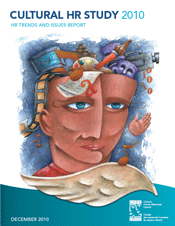 |
Cultural HR Study 2010The Cultural Human Resources Council's (CHRC) much anticipated Cultural HR Study 2010 is now online. The Study, conducted by the Conference Board of Canada, draws on the input of thousands of employers and workers from the entire cultural community in Broadcasting; Digital Media; Film and Television; Heritage; Live Performing Arts; Music and Sound Recording; Visual Arts and Crafts; and Writing and Publishing. This is the largest HR study ever undertaken on the cultural sector in Canada. Purchase all three documents that make up HR Study 2010 in a printable electronic format The Cultural Human Resources Council's (CHRC) much anticipated Cultural HR Study 2010 is now online. The Study, conducted by the Conference Board of Canada, draws on the input of thousands of employers and workers from the entire cultural community in Broadcasting; Digital Media; Film and Television; Heritage; Live Performing Arts; Music and Sound Recording; Visual Arts and Crafts; and Writing and Publishing. This is the largest HR study ever undertaken on the cultural sector in Canada. It includes both a Labour Market Information (LMI) report, rich with the most complete set of tables and detailed statistics ever assembled on the cultural labour force; and an in-depth report on HR Trends and Issues faced by employers, employees and the self-employed. The LMI report documents the breadth and strength of the sector with a labour force of 539,000 employers and workers across the country, and an economic impact of $39 billion or 3.1% of GDP. The HR Trends and Issues report is based on interviews, consultations and a survey of close to 3,000 employers, artists and cultural workers from across the sector and across the country. Highlights include industry fast facts; environmental overviews of HR issues, with employer and worker perspectives; and promising policies, programs and practices. The overriding issue in all cultural sub-sectors is the "digital tsunami" that is changing the way art and cultural products are created, produced, distributed, marketed and preserved. In its wake are critical HR issues such as the need for new skills training, new business models and new partnerships to enable Canada's cultural workers to take full advantage of the global marketplace. |
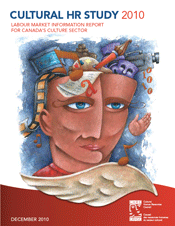 |
Labour Market Information for Canada's Cultural SectorThe Labour Market Information (LMI) report is rich with the most complete set of tables and detailed statistics ever assembled on the cultural labour force. It documents the breadth and strength of the sector with its labour force of 539,000 employers and workers across the country, and its economic impact of $39 billion or 3.1% of GDP. This report is part of the Cultural HR Study 2010. The report begins by defining the scope of the sector and providing a definition of cultural goods and services and the creative chain. It then describes and analyses cultural occupations (in terms of employment profile, demographic profile and labour market performance); and employers (including profiles by cultural domain). Finally, it provides an economic overview and financial performance by sub-sector. Recommendations in the final chapter summarize the report. It closes with a series of six appendices which back up the findings and conclusions. Contents
|
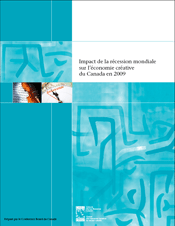 |
The Effect of the Global Economic Recession on Canada's Creative Economy in 2009This report is part of the Cultural HR Study 2010.
Highlights The global recession is having a profoundly negative impact on most sectors of the Canadian economy this year. The Canadian economy entered into a recession in the fourth quarter of 2008, and is expected to continue contracting through much of 2009 before turning around later in the year. Canada's culture sector is not immune to the effects of the global recession. Indeed, the analysis presented in this report shows that the culture sector of Canada's economy will be hit harder by the global recession than the overall Canadian economy. Real value-added output, or gross domestic product (GDP), for the Canadian economy is expected to be 4 per cent lower in 2009 than it would have been in the absence of the global recession. In comparison, real value-added output in Canada's culture sector is expected to be 4.8 per cent lower in 2009 than it would have been had there not been a recession. Our estimates suggest the global recession is likely to reduce real direct value-added output of Canada's culture sector by about $2.2 billion in 2009. Other key findings from the Conference Board's analysis of the impact of the global recession on Canada's culture sector can be summarized as follows:
|
